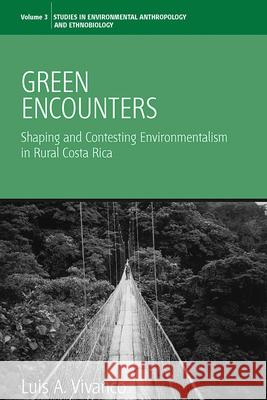Green Encounters: Shaping and Contesting Environmentalism in Rural Costa Rica » książka
Green Encounters: Shaping and Contesting Environmentalism in Rural Costa Rica
ISBN-13: 9781845455040 / Angielski / Miękka / 2007 / 240 str.
"Vivanco's well-written work clearly raises important questions regarding whether or not ecotourism can overcome the ecological and social equity challenges of sutainable development." - Choice "The work excels at showing how environmental conservation oat Monte Verde is and has been the result of a shifting range of social, political, and economic forces, and it also excels at showing the variety of environmentalisms that can be found there." - JRAI Since the 1970s and 1980s, Monte Verde, Costa Rica has emerged as one of the most renowned sites of nature conservation and ecotourism in Costa Rica, and some would argue, Latin America. It has received substantial attention in literature and media on tropical conservation, sustainable development, and tourism. Yet most of that analysis has uncritically evaluated the Monte Verde phenomenon, using celebratory language and barely scratching the surface of the many-faceted socio-cultural transformations provoked by and accompanying environmentalism. Because of its stature, Monte Verde represents an ideal case study to examine the socio-cultural and political complexities and dilemmas of practicing environmentalism in rural Costa Rica. Based on many years of close observation, this book offers rich and original material on the ongoing struggles between environmental activists and of collective and oppositional politics to Monte Verde's new "culture of nature." Luis A. Vivanco is Assistant Professor of Anthropology at the University of Vermont (1999-present). He received a Ph.D. in Cultural Anthropology from Princeton University. He is co-editor of Tarzan was an Ecotourist...and Other Tales in the Anthropology of Adventure (Berghahn Books, 2006). He is a co-editor of Talking About People: Readings in Contemporary Cultural Anthropology (McGraw Hill). His research focuses on the culture and politics of nature conservation, ecotourism, and sustainable development in Costa Rica and Oaxaca, Mexico.
"Vivancos well-written work clearly raises important questions regarding whether or not ecotourism can overcome the ecological and social equity challenges of sutainable development." - Choice"The work excels at showing how environmental conservation oat Monte Verde is and has been the result of a shifting range of social, political, and economic forces, and it also excels at showing the variety of environmentalisms that can be found there." - JRAISince the 1970s and 1980s, Monte Verde, Costa Rica has emerged as one of the most renowned sites of nature conservation and ecotourism in Costa Rica, and some would argue, Latin America. It has received substantial attention in literature and media on tropical conservation, sustainable development, and tourism. Yet most of that analysis has uncritically evaluated the Monte Verde phenomenon, using celebratory language and barely scratching the surface of the many-faceted socio-cultural transformations provoked by and accompanying environmentalism. Because of its stature, Monte Verde represents an ideal case study to examine the socio-cultural and political complexities and dilemmas of practicing environmentalism in rural Costa Rica. Based on many years of close observation, this book offers rich and original material on the ongoing struggles between environmental activists and of collective and oppositional politics to Monte Verdes new "culture of nature."Luis A. Vivanco is Assistant Professor of Anthropology at the University of Vermont (1999-present). He received a Ph.D. in Cultural Anthropology from Princeton University. He is co-editor of Tarzan was an Ecotourist...and Other Tales in the Anthropology of Adventure (Berghahn Books, 2006). He is a co-editor of Talking About People: Readings in Contemporary Cultural Anthropology (McGraw Hill). His research focuses on the culture and politics of nature conservation, ecotourism, and sustainable development in Costa Rica and Oaxaca, Mexico.











